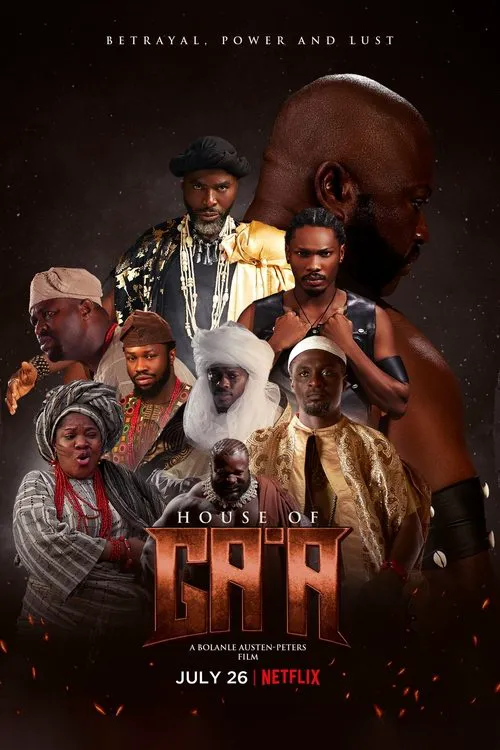House of Ga'a

Plot
In the vast expanse of West African history, the Oyo Empire, a realm of mighty warriors and wise kings, flourished under the shadows of its mighty gods and ancestors. Among the most powerful of these warriors was Bashorun Ga'a, a man forged in the unforgiving crucible of battle and fueled by an insatiable thirst for power. He rose to prominence during the height of the Oyo Empire, where, paradoxically, his prowess as a warrior and strategist propelled him to dizzying heights, making him the most influential man of the realm. As Bashorun Ga'a's influence spread far and wide, he became, without realizing it, a force unto himself, more powerful than even the mighty kings who sat upon the coveted throne of the Oyo Empire. Those who held the crown, often mere puppets of the great Bashorun, were relegated to minor roles, their authority eroded by Ga'a's unyielding grip on the power dynamics of the realm. This phenomenon would come to be a hallmark of his rule, with the mighty warrior manipulating strings behind the scenes to suit his desires. However, the insatiable nature of Bashorun Ga'a's ambition soon came into conflict with the very fabric of the society he had risen to dominate. As the years passed by, his insatiable hunger for power turned on his own kin, and the bonds of blood ties, once supposed to hold him to higher values of honor and loyalty, began to fray. He became emboldened by his unyielding grip on the Oyo Empire and the power it granted him; yet, his actions would soon prove to be his undoing. Despite his growing influence and power, Bashorun Ga'a was forced to confront the limitations imposed by the traditional Oyo Empire hierarchies. He needed to navigate the fragile balance of power, one threatened by his own machinations, to maintain control over the empire. Thus, he found himself walking a precarious tightrope, torn between the power that sustained him and the very system that would ultimately lead to his downfall. Moreover, it was during this tumultuous period that tensions began to rise as Bashorun Ga'a started to undermine the authority of the Oyo kings, whose legitimacy and authority rested upon their lineage and spiritual connection to their gods. This led to increasing resentment from the royal families and other influential members of the empire, many of whom saw Bashorun Ga'a's actions as a threat to their status and the very fabric of their society. In the shadow of these unfolding events, Bashorun Ga'a began to realize that his power had grown too great for even his own ambition to contain. He knew that he had become a force to be reckoned with, and yet, he was also acutely aware of the perils of overreaching. This introspection, however, was too little, too late. The embers of rebellion had already been ignited, fuelled by the frustration and outrage of those he had wronged. As fate would have it, it was a combination of the very same blood ties he had disregarded and the machinations of those who sought to topple him that proved to be Bashorun Ga'a's undoing. The once-mighty warrior, whose ambition had brought him such unparalleled heights of power, was now poised on the very precipice of downfall. His own blood had turned against him, fueled by the bitter taste of resentment and the desire for revenge. In the face of this inevitable storm, Bashorun Ga'a found himself forced to confront the reality of his own hubris and the devastating consequences of his actions. As his empire teetered on the brink of collapse and the seeds of rebellion he had sown began to bear fruit, he realized too late that true power lies not in the mere holding of it but in the wisdom to wield it well. Ultimately, the epic story of Bashorun Ga'a became a cautionary tale of the futility of unchecked ambition and a stark reminder that the highest pedestal of power can also prove to be the most precarious of perches. The tale of the Oyo Empire during its heyday became a metaphor for the universal human quest for dominance and the perils that follow when unchecked desires and unyielding ambition are allowed to run amok.
Reviews
Recommendations





